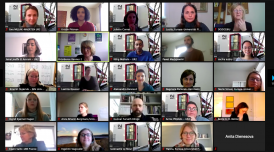
On March 11th and 12th, over 40 staff members from eMERGE partner universities held their first virtual Erasmus Staff Training Week. Typically a time for informal meetings and in-person exchanges between members of International Offices and teaching staff of different universities, Erasmus training weeks promote the transfer of knowledge and good practices. This year, due to the health context, the eMERGE Staff Week was held entirely online with each member being asked to participate through the presentation of their specific procedures and initiatives.
As stated in the welcome address given by Dr. Lesley Lelourec, Vice-President in charge of Internationalisation at Rennes 2 University, “Our goal over the next two days will be to get to know one another in an effort to facilitate a greater and deeper collaboration between our universities. Over the course of several months, our combined efforts to develop and adopt common projects will support our aim of creating a successful bid for the next European University Initiative call.”
Strengthening the Foundations
While the eMERGE Steering Committee holds regular virtual meetings in order to discuss ideas and concrete actions that will help to bring the universities closer, the challenge now is to encourage project managers and coordinators, particularly those in the international relations departments, from the 6 universities to share information and best practices in order to create a new decentralized dynamic for the consortium.
As such, the first day’s workshops provided many opportunities to do just that. Topics were varied and ranged from discussions centering on commonalities of academic disciplines, support for health and disability, cost of living and student life issues, to questions linked to the support and monitoring of mobility programs as well as digitalization in the Erasmus + program.
With the aim of facilitating student exchanges within the consortium, two topics in particular were widely discussed on the first day, and are likely to be important for the consortium going forward: student mobility (rates and procedures) and the availability of courses in English at each partner institution. Participants noted some significant differences from one institution to another in both subjects, and many voiced their hopes that the continuation of conversations on related policies and procedures may help to provide them with ideas that can be implemented at a practical level in their institutions.
Sharing Innovation in Green and Service-based Projects
Another key topic of discussion during the meeting centered on environmental and campus initiatives. Each university was asked to present a specific transformative initiative that has been developed on their campus or in coordination with their institution for their community. The goal of which was to learn about projects that could ideally be transposed by other partner universities in the framework of a partnership or Erasmus + programme.

Some of the projects included:
- The University of Limerick presented a number of their ambitious sustainable initiatives which focus on biodiversity, sustainable transport and waste management among other things.
- Inland Norway’s staff discussed their Green Mobility Initiative. Created in coordination with the country’s largest environmental organization and the local municipality, the project promotes biking and assists community members with bike repairs and maintenance in an effort to replace buses and cars as modes of transportation to the campus.
- Matej Bel University presented the ways in which meaningful community service or engagement is a specific component integrated into their curriculum. They have developed several models of service and learning integration, working with partners inside and outside of the university.
- The University of Bretagne-Sud (UBS) shared their Zero-Waste Campus Initiative, a solidarity and eco-responsibility project for students.
- Europa-Universität Flensburg developed a complex cycling infrastructure project in coordination with the city of Flensburg (Germany), complete with campus bicycle repair labs and trolleys.
- Rennes 2 University concluded the session with a presentation of the new ESS Cargo project, a modular, ecological and adaptive space that will be a forum for cooperative projects (involving students, staff and/or residents), a relaxation space, and a creative space with a cultural and artistic focus.
In order to be successful, innovative university projects such as these also need the involvement and leadership of their students. It stands to reason that student inter-university collaboration will also be an essential aspect of the eMERGE partnership. In this respect, the group is already making headway. Student officials from eMERGE institutions kicked off the year by launching the eMERGE Student Forum (ESF), a space where students discuss the different ways in which they can contribute to the future activities and the direction of this innovative partnership with a bottom-up approach.
A Pathway Towards the Future
One of the most important issues discussed on the second day of meetings was the continuation of efforts to create a “European Pathway”, a common academic program at the Bachelor's level, which will be made available to all students of each partner university, and which will include new forms of mobility (short-term, blended, and others) in conjunction with the Erasmus + programme.
Professor Christine Chauvin, Vice-President in charge of Internationalisation at the University of Bretagne-Sud, presented the group with a concrete example of how such a program might work, by discussing the newly-created UBS-specific European and International Pathway. Inspired from work done during the original eMERGE bid, the Pathway was adapted for their university community and has already been approved.
While the finalization of a common Pathway is still a work in progress for all eMERGE partners, the consortium will be looking for ways to capitalize on this and other moments of cooperation and in other domains, such as common research initiatives, creative mobility options and more.
WHO WE ARE:
eMERGE : European Margins Engaging for Regional and Global Empowerment
We are an alliance of 6 diverse regional institutions of higher education located on the European periphery who have come together through a shared desire to tackle the particular challenges of engaging with Europe and creating the European Educational Area in these marginal spaces.
Working closely together since 2019, we developed a bid for the second call of the European Commission's European Universities Initiative (EUI). While not selected during the call, we have been continuing our work to create concrete and lasting projects that will use a bottom-up approach for the benefit of our combined university communities.






